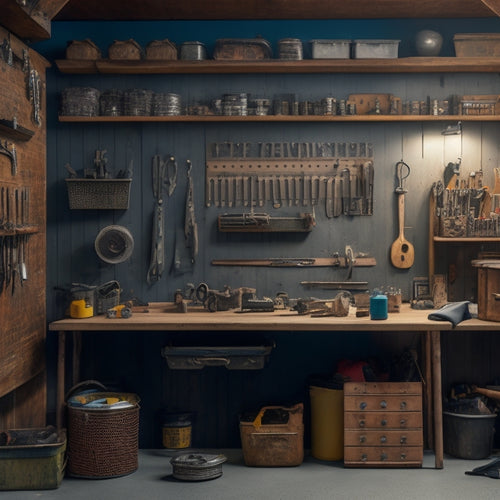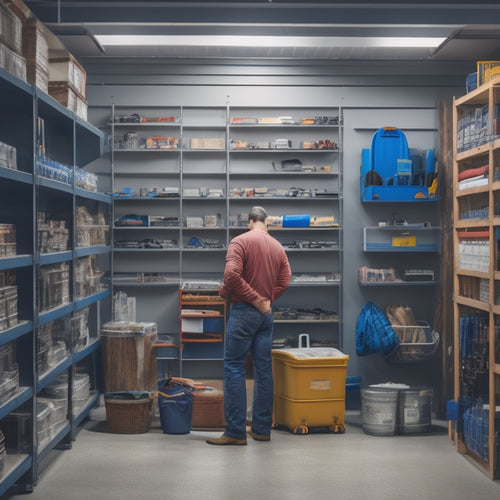
Why Are You Wasting Time in Your Workshop?
Share
You're sacrificing hours of productivity in your workshop due to avoidable inefficiencies. A cluttered workspace, inefficient tool storage, and poor time management are silently sabotaging your workflow. Disorganization leads to wasted time searching for tools, frustration, and delayed projects. Outdated methods and inefficient storage solutions only add to the chaos. Every minute counts in your workshop, and it's time to take control. By streamlining your workflow and optimizing your workspace, you'll uncover the secrets to maximizing your productivity and getting the most out of your time – and that's just the beginning of what you're about to discover.
Key Takeaways
• Cluttered workspaces and disorganization lead to wasted time, frustration, and decreased productivity in the workshop.
• Inefficient storage solutions and lack of categorization cause tools and materials to be misplaced, wasting valuable time.
• Poor time management and procrastination hinder creativity, leading to delayed projects and reduced motivation.
• Inadequate lighting and poor workshop layout lead to errors, inaccuracies, and decreased precision, further reducing productivity.
• Failure to adopt new technologies, learn new skills, and stay updated with industry advancements sacrifices efficiency and leads to wasted time.
Disorganized Workspace Wastes Valuable Time
As you navigate your workshop, cluttered with scattered tools and supplies, you're wasting valuable time searching for the one thing you need to complete your project. This disorganization not only frustrates you but also hinders your productivity.
A well-organized workspace, on the other hand, allows you to focus on the task at hand, saving you time and energy.
Effective workspace organization is essential for time management. When you know exactly where everything is, you can quickly locate the tool or material you need, eliminating wasted minutes spent searching. This, in turn, enables you to manage your time more efficiently, completing projects faster and meeting deadlines with ease.
Inefficient Tool Storage Hurts Productivity
You've optimized your workspace, but if your tools are still scattered throughout your workshop, you're only halfway to maximum productivity. Inefficient tool storage is a major productivity killer, and it's time to tackle it.
Think about it: every minute you spend searching for a misplaced tool is a minute wasted. That's time that could be better spent on your project.
An efficient organization system is key to tool accessibility. When your tools are neatly stored and easily accessible, you can focus on the task at hand.
Invest in a pegboard, tool chests, or bins to keep your tools organized and within reach. Label each storage unit so you can quickly identify what's inside. This simple system will save you time and reduce frustration.
Poor Time Management Kills Creativity
When you let distractions and procrastination consume your workshop time, you're not just wasting hours - you're stifling your creativity.
You're likely setting yourself up for failure by taking on unrealistic task expectations, which can lead to frustration and burnout.
Time Wasted on Distractions
Poor time management skills turn your workshop into a breeding ground for distractions, killing creativity and leaving you with little to show for your efforts. As you struggle to stay focused, you're not alone. Most makers face the same challenges, but it's time to take control.
| Distraction | Time Wasted | Solution |
|---|---|---|
| Social Media | 30 minutes | Schedule breaks |
| Email Notifications | 15 minutes | Turn off notifications |
| Chatty Coworkers | 20 minutes | Set boundaries |
| Cluttered Workspace | 10 minutes | Organize your space |
| Personal Errands | 45 minutes | Prioritize tasks |
Procrastination Kills Productivity
Procrastination, a productivity killer, silently sabotages your workshop's creative potential, leaving projects unfinished and deadlines unmet. As you put off tasks, you're not only delaying progress but also diminishing your motivation and energy.
The consequences of procrastination are severe, leading to missed opportunities, lost revenue, and a damaged reputation.
To break free from procrastination's grip, you need effective time management tips. Start by prioritizing tasks, focusing on the most critical ones first.
Use productivity hacks like the Pomodoro Technique, which involves working in focused 25-minute increments, followed by a five-minute break. This technique helps you stay on track, avoid distractions, and maintain momentum.
Additionally, identify the distractions that derail your workflow and eliminate them. Turn off notifications, log out of social media, and create a conducive work environment.
By managing your time wisely and avoiding distractions, you'll be able to tackle tasks efficiently, meet deadlines, and access your workshop's full creative potential.
Unrealistic Task Expectations
By setting unrealistic task expectations, you're inadvertently suffocating your creativity, as overcommitting and underestimating the time required for tasks can lead to frustration, burnout, and a lack of innovative solutions. You're not alone in this trap, but recognizing the signs and making a change is crucial.
Here are four common indicators of unrealistic task expectations:
-
Overambitious goals: You're trying to tackle too much in too little time, leading to a sense of overwhelm and stress.
-
Unrealistic deadlines: You're setting timelines that are impossible to meet, guaranteeing disappointment and frustration.
-
Underestimating task complexity: You're assuming a task will take less time or effort than it actually requires, leading to scope creep and delays.
- Lack of flexibility: You're not leaving room for unexpected setbacks or changes, making it difficult to adapt and adjust.
Cluttered Benches Slow Down Projects
Packed with tools, materials, and half-finished projects, your workbench slows you down, forcing you to spend valuable time searching for what you need instead of focusing on the task at hand. This cluttered chaos not only frustrates you but also significantly affects your project efficiency.
Every minute you waste searching for a specific tool or material is a minute taken away from completing your project.
Effective bench organization is vital to streamlining your workflow. By categorizing and assigning a designated space for each tool and material, you'll be able to quickly locate what you need, saving you time and energy.
Implementing a 'home for everything' system will keep your workbench clear and clutter-free, allowing you to work more efficiently. With a well-organized workspace, you'll be able to focus on the task at hand, completing projects faster and with greater accuracy.
Missing Tools Cause Frustration Delays
When you can't find the tool you need, it's frustrating and slows you down. You're not alone - disorganized tools are a common problem that can lead to wasted time and decreased productivity.
Tool Disorganization Consequences
Your workshop's tool disorganization leads to frustrating delays, as you waste precious time searching for misplaced items, only to find them hidden behind other clutter or, worse, nowhere to be found. This lack of tool organization not only hinders your productivity but also affects your time management. You're forced to spend more time searching for tools than actually working on your projects.
Here are just a few consequences of tool disorganization:
-
Delays in project completion: Without easy access to the tools you need, projects take longer to complete, and deadlines are missed.
-
Increased stress levels: The frustration of searching for tools can lead to increased stress levels, making it harder to focus on your work.
-
Reduced productivity: When you can't find the tools you need, you're forced to work around them, reducing the quality of your work and your overall productivity.
- Financial losses: In extreme cases, tool disorganization can lead to financial losses due to missed deadlines, wasted materials, and lost opportunities.
Lost Time Adds Up
As you waste precious minutes searching for missing tools, the clock ticks away, and the cumulative effect of these small delays can lead to significant time losses. You might think it's crucial to just a few minutes here and there, but those minutes add up quickly.
Before you know it, you've lost an entire hour or more. That's time that could be better spent on actual work, not searching for misplaced tools.
To avoid this, it's vital to implement efficient time tracking and organizational systems. By keeping track of how you spend your time, you'll be able to identify areas where you can improve.
For example, you might notice that you're spending a lot of time searching for a specific tool. This could be a sign that you need to implement a better storage system for that tool.
Disaster in the Making
Missing tools trigger a chain reaction of frustration, delay, and ultimately, a disastrous impact on your workshop's productivity. When you can't find the right tool, you're forced to improvise, leading to preventable accidents and avoidable mistakes. This not only wastes time but also puts you and others at risk.
Here are just a few examples of how missing tools can cause chaos in your workshop:
-
Delayed projects: Without the right tool, you can't complete tasks on time, leading to project delays and missed deadlines.
-
Inefficient workarounds: You're forced to find alternative methods, which are often less efficient and more time-consuming.
-
Increased stress: The pressure to find a solution quickly can lead to mistakes, accidents, and a higher stress level.
- Financial losses: Delays and mistakes can result in financial losses, damaging your reputation and bottom line.
Inadequate Lighting Affects Accuracy
Poor lighting in your workshop forces you to squint, strain, and second-guess your measurements, ultimately leading to errors and inaccuracies in your projects. Inadequate lighting not only affects your eyesight but also impairs your ability to focus, making it difficult to achieve precision work. You can't afford to compromise on accuracy, especially when working on critical components or intricate designs.
Proper lighting is essential to guarantee you're working with precision and accuracy. It enables you to see the smallest details, read measurements correctly, and make precise cuts. With sufficient lighting, you'll reduce the risk of mistakes, rework, and waste.
Additionally, proper lighting helps you work more efficiently, as you won't need to constantly adjust your position or strain your eyes to see what you're doing.
Invest in high-quality lighting solutions for your workshop, such as LED lights or task lamps, to illuminate your work area. This simple investment will pay off in the long run by saving you time, reducing errors, and improving the overall quality of your work. Don't let inadequate lighting hold you back from producing exceptional results.
Unnecessary Trips Waste Workshop Time
Every minute you spend walking back and forth to fetch tools or materials is a minute you're not spending on actual work, and those minutes add up quickly. Unnecessary trips waste workshop time, hindering your productivity and efficiency.
To tackle this challenge, optimizing your workshop layout and tool organization is crucial.
Here are some time-saving strategies to keep in mind:
-
Designate a 'launching pad': Choose a specific area to keep frequently used tools and materials, reducing the need for constant retrieval.
-
Implement a 'clean as you go' policy: Put away tools and materials after each use to maintain a clutter-free workspace.
-
Label and categorize storage: Clearly label and categorize storage bins and shelves, making it easy to find what you need quickly.
- Keep high-use items within arm's reach: Place often-used items in easy-to-access locations, minimizing the need for unnecessary trips.
Outdated Methods Reduce Efficiency
By holding onto traditional methods and avoiding modern innovations, you're likely sacrificing efficiency and productivity in your workshop. You might be thinking, 'But this is how I've always done it!' However, clinging to outdated techniques can lead to wasted time and energy.
For example, using manual tools instead of automated ones can slow down your workflow, making it harder to meet deadlines. Furthermore, failing to adopt new technologies and software can make tasks more complicated than they need to be.
To optimize your time management and workflow efficiency, it's crucial to stay updated with the latest industry advancements. Consider investing in modern machinery, tools, and software that can streamline your processes.
Additionally, take the time to learn new skills and techniques that can help you work more efficiently. By doing so, you'll be able to complete tasks faster, with better quality, and with less effort.
Don't let outdated methods hold you back – it's time to bring your workshop into the 21st century and reap the benefits of increased productivity and efficiency.
Lack of Organization Slows Progress
Disorganized workspaces and chaotic filing systems are stealing hours from your day, hindering your ability to complete tasks efficiently. You're not alone in this struggle, but recognizing the impact it has on your productivity is crucial.
A cluttered workspace and disorganized files lead to wasted time searching for tools, materials, and information, ultimately affecting your workspace efficiency.
Here are a few examples of how disorganization slows you down:
-
Misplaced tools and materials: You spend 15 minutes searching for a specific wrench, only to find it buried under a pile of other tools.
-
Challenges in locating information: You need to refer to a specific project plan, but it's buried in a messy stack of papers, wasting 30 minutes of your time.
-
Ineffective workflows: You're forced to work around clutter, taking longer to complete tasks and reducing your overall productivity.
- Anxiety and annoyance: A cluttered workspace leads to increased stress levels, making it harder to focus and manage your time effectively.
Insufficient Storage Creates Chaos
You're likely familiar with the frustration of running out of space to store your tools, materials, and equipment, leaving them scattered throughout your workshop and creating a breeding ground for chaos. This lack of storage leads to wasted time searching for misplaced items, damaged tools, and decreased productivity.
Implementing effective storage solutions is crucial to regain control of your workshop. Start by categorizing your items into groups, such as frequently used tools, infrequently used equipment, and materials. Then, assign a designated storage space for each group. Consider investing in shelving units, cabinets, and bins to keep items off the floor and out of the way.
Label each storage space to make sure you can quickly identify where items are stored. Additionally, implement organization techniques like the 'first in, first out' rule for materials and the 'home for everything' approach, where each item has a designated spot.
Frequently Asked Questions
How Can I Maintain My Organized Workspace Over Time?
To maintain your organized workspace over time, you're practicing Workspace Feng Shui by positioning tools strategically, and consistently applying decluttering techniques, like the "one in, one out" rule, to keep your area efficient and clutter-free.
What Are Some Creative Storage Solutions for Small Workshops?
You'll maximize your small workshop's space by installing vertical shelving and utilizing drawer dividers to categorize supplies, keeping frequently used items accessible and lessening clutter, allowing you to focus on projects, not searching for tools.
Can a Workshop Be Too Organized, Stifling Creativity?
Your workshop is like a canvas, waiting for brushstrokes of inspiration. You find a delicate creativity balance when your workspace flow isn't hindered by clutter chaos, but rather fueled by a controlled, creative messiness that sparks innovation.
How Do I Prioritize Tasks When Working on Multiple Projects?
You're juggling multiple projects, so prioritize tasks by focusing on deadlines, allocating specific time slots for each task, and avoiding multitasking, which can decrease productivity and increase stress.
Are There Any Apps or Tools to Help With Workshop Time Management?
"Imagine a master chef without a kitchen timer - chaos! You need tools to optimize workshop time. Try productivity apps like Toggl, Harvest, or RescueTime for seamless time tracking, ensuring you're cooking up efficiency, not wasting precious hours."
Related Posts
-

Design Considerations for a Custom Pegboard
When designing a custom pegboard, you'll want to start by evaluating your storage needs, considering factors like too...
-

Building Garage Shelves in 7 Easy Steps
You're about to convert your garage into a highly functional storage space by building custom shelves in just 7 easy ...
-

Heavy-Duty Commercial Rolling Shelving Racks
You need heavy-duty commercial rolling shelving racks that optimize your storage capacity, streamline operations, and...


